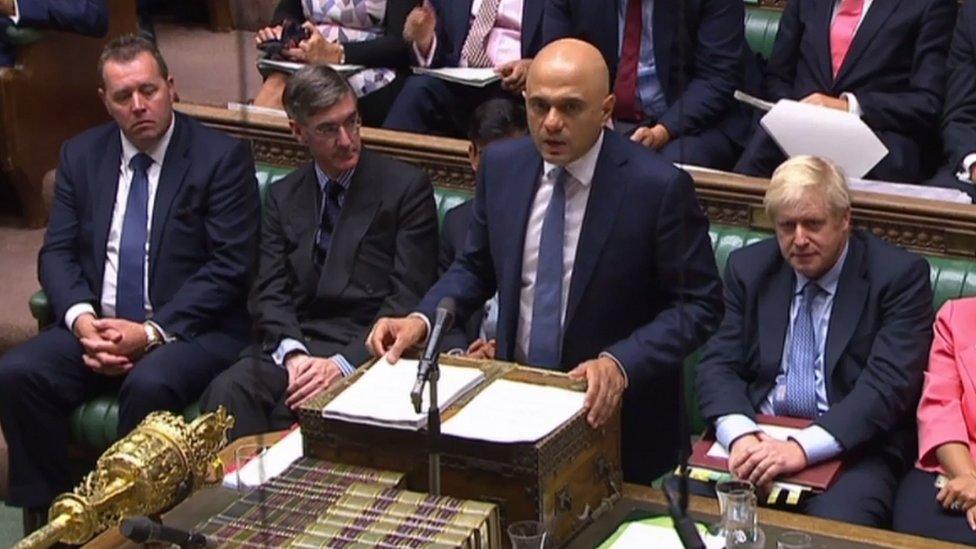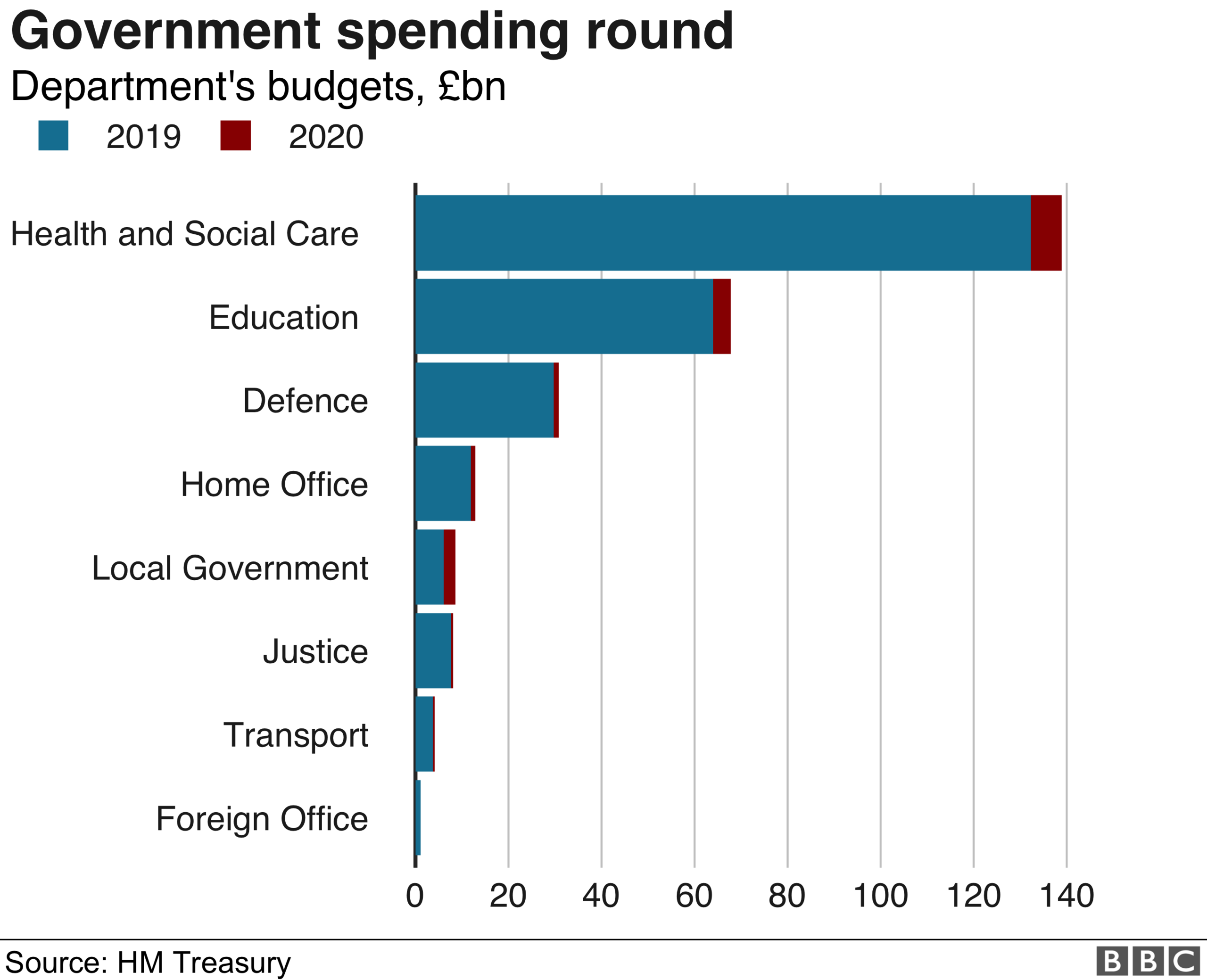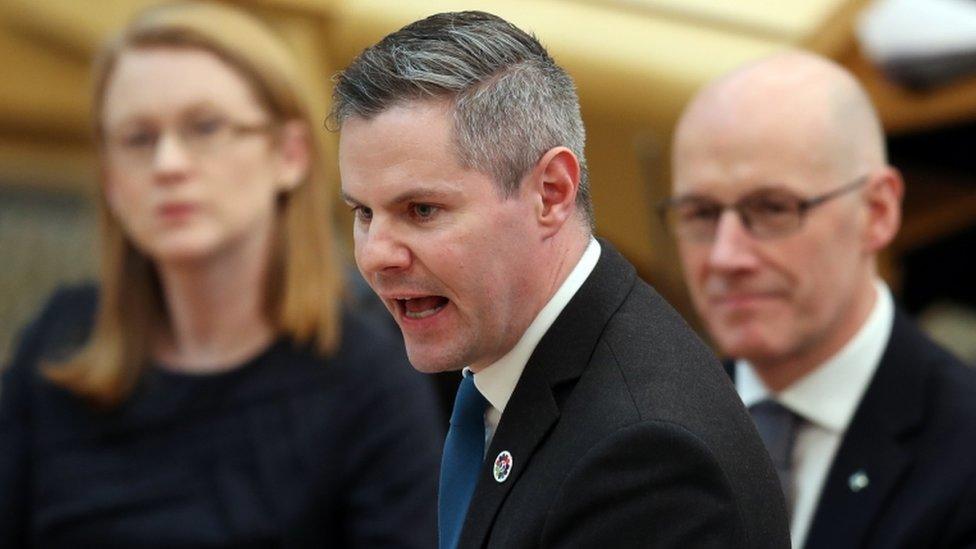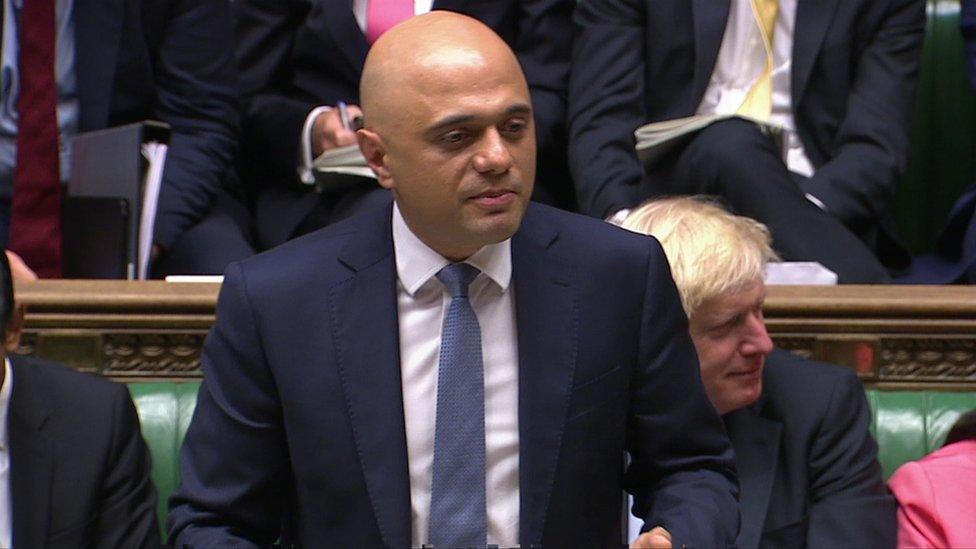Spending Review: Sajid Javid departs from the formula
- Published

Sajid Javid set out his spending plans at a tumultuous time for the UK government
Every Chancellor has his own style. I say "his" advisedly as, thus far, there has not been a female occupant of the office.
William Ewart Gladstone used to numb the House with the length of his speeches, as well as their erudition. His first Budget address endured for nearly five hours.
In more modern times, Gordon Brown gained renown for a technique whereby he would apparently build a proposition, only to countermand it with a swift and unexpected reveal, rather like a conjuror or a crime writer.
Philip Hammond - until yesterday, a Tory MP - developed a subtle style. Not a particularly thrilling orator, Spreadsheet Phil would compensate for that with self-deprecating humour.
Today, Sajid Javid struggled somewhat to project his own image. Indeed, he was chided by the Speaker, John Bercow, for failing to get on with the job at all.
Mr Javid was delivering the outcome of his Spending Review. In fact, it was more of a spending round as the vast majority of the announcements apply for but a single year, rather than the three which a full review would presage.
And the Speaker's disquiet? Instead of getting on with the solemn business of listing numbers, Mr Javid indulged in a protracted defence of Brexit and an equally prolonged attack on the Labour Party.
Actually, the Speaker wasn't the first to grow weary. Kenneth Clarke, a former Chancellor (technique, suede shoes and a disarming chuckle) rose to his feet.
Now the Father of the House, he appeared to be about to break tradition by lodging a point of order while the Chancellor was speaking.
The Speaker intervened to interpret. He presumed that Mr Clarke was about to object to the tone and content of the statement. Cue Fatherly nodding.
Speaker Bercow advised Mr Javid to adapt his structure. In short, to get on with it. Mr Javid looked like a puzzled schoolboy, chided by the Latin master. On he persisted.

Others offered alternative explanations for the Chancellor's demeanour, wickedly suggesting that he was in no way responsible for either the speech, its content or its accompanying import.
All these, it was suggested, lay with his neighbour. With Number 10 Downing Street, rather than 11. Indeed, Labour explicitly suggested that the strategy had been devised by Dominic Cummings, the prime minister's special adviser.
Mr Javid looked just a little hurt.
In truth, though, this was an intriguing statement. It was meant to demonstrate that this UK government is about much, much more than Brexit. Which was only faintly undermined by the lengthy opening oration about…you've guessed it.
Then the content: "Turning the page on austerity." More money for instrastructure, police, schools and the NHS.
Was this Mr Javid disavowing his predecessors? No, that wouldn't be fair. He did take pains to stress the necessity of tackling the underlying deficit. But the theme was one of a fresh start - the implication being that the preceding administration had lacked confidence.
Actually, the implicit theme was of preparing for a possible election on October 15. You know, the one which the prime minister doesn't want.
The announcements were predicated upon popular spending priorities. Hospitals, schools, bobbies on the beat.
Further, Mr Javid sought to create a clear distinction between his approach and that pursued by Labour. To quote him: "Labour left behind a bankrupt Britain and we fixed it."

Derek Mackay was not overly impressed by Mr Javid's statement
Now, one mustn't complain about such tactics. Every politician facing a potential election - however it may arise - will seek advantage and seek further to undermine opponents.
Labour's John McDonnell wasn't impressed. He said the speech consisted of "grubby electioneering" and a "compendium of meaningless platitudes".
And the response from the Scottish government? The Finance Secretary Derek Mackay welcomed the payment of £160m to Scottish farmers, settling a dispute. And he welcomed the allocation of £1.2bn to the overall Scottish budget from Barnett consequentials.
You can hear the word "but" in the air, can't you? Astute reader that you are, you would be right.
Mr Mackay noted that the cash for farmers was overdue and should have been paid much sooner. Further, he had substantial concerns about the paucity of other detail attached to the statement.
Because of the fiscal framework painstakingly negotiated with the Treasury by Mr Mackay's predecessor, John Swinney, the Scottish Government needs clarity in a range of parameters before being able to set out their own Budgetary plans.
Today's statement, according to Mr Mackay, provided outline detail of spending for one year only, not an extended period. But nothing on taxation (which, presumably, will come in the full UK Budget, should we get to that) and nothing on economic forecasts.
It didn't compensate for austerity. It didn't prepare for the "calamity" of Brexit. It didn't, in sum, do the business.
The Speaker had invited the Chancellor to consider that spending statements generally follow a formula.
You know the sort of thing. One or two weak but statutory jokes, a burst of fiscal statistics, then an announcement of the goodies on offer, leaving the stinkers to emerge from the accompanying documents published in the House of Commons library.
In so many ways, Mr Javid departed from that. In every respect, curious times.
- Published4 September 2019

